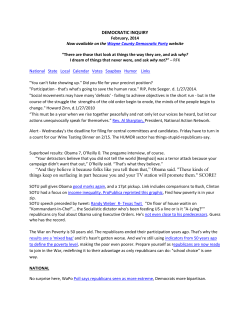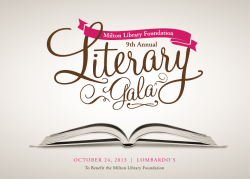
Republican Political Theory from Polybius to Pettit NB: Course description:
Republican Political Theory from Polybius to Pettit Megan Gallagher | mgallagher@ucla.edu Sample syllabus NB: This is an upper division, discussion-based course designed to meet once a week. Course description: Republicanism is simultaneously one of the most ancient political concepts and one of the most pertinent to contemporary politics. Its relevance stems from the notion that the res publica, or “public thing,” is held in common by a people, all of whom have a vested interest in, and shared responsibility for, the outcome of certain political decisions. Republicanism maintains that those in authority must be held to account and that only through responsible political stewardship, civic virtue, and the dispensation of one’s duties as citizen can political freedom be achieved and upheld. Yet republics have historically been fraught with problems, from the worries over establishing virtue in Cicero, to the class tensions and imperialist concerns we find in Machiavelli’s Discourses, to the warning against vulnerability to corruption in Rousseau’s Social Contract. It thus bears asking if and how republicanism is complementary to, distinct from, inferior or superior to deliberative democracy and liberalism. Topics to be considered include: the historical development of republican political thought in the ancient and early modern world; republicanism’s relationship to empire; the role of civic virtue in maintaining republics; republican definitions of freedom; and the contemporary (re)emergence of republicanism and “neo-republicanism” in political philosophy. Primary texts Polybius, The Histories Cicero, On Duties Sallust, Catiline’s Conspiracy Machiavelli, The Discourses and The Prince Milton, “The Tenure of Kings and Magistrates” Montesquieu, The Spirit of the Laws Rousseau, The Social Contract Arendt, “What is Freedom?” and On Revolution Pettit, Republicanism: A Theory of Freedom and Government Shorter readings will be made available on the class website. Requirements • Two papers, one due at midterm and the second during exam week • One page reading responses due weekly in class. One, but only one, week may be skipped at the student’s discretion without penalty. • Attendance and active participation Grading • First paper: 20% • Second paper: 35% • Reading responses: 15% • Participation: 30% Republican Political Theory | sample syllabus | Gallagher 1 Reading schedule Week 1 | Introduction: Defining What a Republic Is – And Is Not • Christopher Nadon, “Republicanism: Ancient, Medieval, and Beyond,” in A Companion to Greek and Roman Political Thought, pp. 529-541 • Isaiah Berlin, “Two Concepts of Liberty,” in The Proper Study of Mankind: An Anthology of Essays, pp. 191-242 Week 2 | Polybius and Mixed Constitutions • Polybius, The Histories, Book VI • Fergus Millar, “Polybius and the Roman Constitution,” in The Roman Republic in Political Thought, pp. 23-36 Week 3 | Cicero and Civic Virtue • Cicero, On Duties (entire but skim Book II, §52-§87) • Malcolm Schofield, “Republican Virtues,” in A Companion to Greek and Roman Political Thought, pp. 199-213 Week 4 | Sallust, Conspiracy, and the Corruption of Republics • Sallust, Catiline’s Conspiracy • Daniel Kapust, “An Ambiguous Republican: Sallust on Fear, Conflict, and Community,” in Republicanism, Rhetoric, and Roman Political Thought, pp. 27-52 Week 5 | Civic Humanism and the Republican Revival: Enter Machiavelli • Quentin Skinner, “Republican Virtues in the Age of Princes,” in Visions of Politics II: Renaissance Virtues, pp. 142-159 • Machiavelli, The Prince (Chapters VI-VIII; XXV) • Machiavelli, The Discourses (Book I, chapters I-VI, IX, X, XVI-XX) Week 6 | Machiavelli, Libertas, and Imperium • Machiavelli, The Discourses (Book II, chapters I-IX; Book III, chapters I, III) • Quentin Skinner, “Machiavelli on virtù and the Maintenance of Liberty,” in Visions of Politics II: Renaissance Virtues, pp. 160-185 Week 7 | Milton, Republicanism, and Regicide • Milton, “The Tenure of Kings and Magistrates” • Victoria Kahn, “The Metaphorical Contract in Milton’s Tenure of Kings and Magistrates,” in Milton and Republicanism, pp. 82-105 Week 8 | Montesquieu and the Political Science of Republicanism • Montesquieu, The Spirit of the Laws (Book 1, Chapter 1.3; Books 2, 3, 5, 8; Book 11, chapters 11.1-11.4) • Nannerl Keohane, “Virtuous Republics and Glorious Monarchies: Two Models in Montesquieu’s Political Thought,” Political Studies 20.4 (1972), pp. 383-396 Republican Political Theory | sample syllabus | Gallagher 2 Week 9 | Rousseau and the General Will • Patrick Riley, “The General Will Before Rousseau,” Political Theory 6.4 (1978), 485516 (skim 485-498) • Rousseau, The Social Contract, Books I and II Week 10 | Rousseau and Civil Religion • Rousseau, The Social Contract, Books III and IV • Graeme Garrard, “On the Utility of Religion” in Rousseau’s Counter-Enlightenment: A Republican Critique of the Philosophes, pp. 69-82 Week 11 | Modern Republicanism • Arendt, “What is Freedom?” • Arendt, On Revolution (introduction and chapter 1) Week 12 | The Rise of Neo-Republicanism • Pettit, Republicanism: A Theory of Freedom and Government (introduction, chapters 1 and 2) Week 13 | Freedom as Non-Domination • Pettit, Republicanism: A Theory of Freedom and Government (chapters 3 and 4; “Republicanism: Once more with Hindsight”) Exam week | Second paper due Bibliography (suggested readings for the second paper) Appleby, Joyce. Liberalism and Republicanism in the Historical Imagination. Cambridge: Harvard University Press, 1992. Armitage, David. “John Milton: Poet Against Empire.” In Milton and Republicanism, eds. David Armitage, Armand Himy, and Quentin Skinner, 206-226. Cambridge: Cambridge University Press, 1995. Bailyn, Bernard. The Ideological Origins of the American Revolution. Cambridge: Harvard University Press, 1992 [1967]. Baker, Keith. “Transformations of Classical Republicanism in Eighteenth-Century France.” The Journal of Modern History 73.1 (2001): 32-53. Balot, Ryan. “Polybius’ Advice to the Imperial Republic.” Political Theory 38.4 (2010): 483-509. Beiner, Ronald. Civil Religion: A Dialogue in the History of Political Philosophy. Cambridge: Cambridge University Press, 2011. Carithers, David, Michael Mosher and Paul Rahe, eds. Montesquieu’s Science of Politics. New York: Rowman & Littlefield, 2000. Castiglione, Dario. “Republicanism and Its Legacy.” Review essay. European Journal of Political Theory 4.4 (2005): 453-465. Colish, Marcia L. “Cicero’s De Officiis and Machiavelli’s Prince.” The Sixteenth Century Journal 9.4 (1978): 80-93. Republican Political Theory | sample syllabus | Gallagher 3 Costa, M. Victoria. “Neo-Republicanism, Freedom as Non-Domination, and Citizen Virtue.” Politics, Philosophy, and Economy 8.4 (2009): 401-419. Fontana, Benedetto. “Sallust and the Politics of Machiavelli.” History of Political Thought 24.1 (2003): 86-108. Goodin, Robert. “Folie Républicaine.” Review essay. Annual Review of Political Science 6 (2003): 55-76. Gould, Philip. “Virtue, Ideology, and the American Revolution: The Legacy of the Republican Synthesis.” American Literary History 5.3 (1993): 564-577. Hankins, James. “Exclusivist Republicanism and the Non-Monarchical Republic.” Political Theory 38.4 (2010): 452-482. Hörnqvist, Mikael. “The Republic’s Two Ends.” In Machiavelli and Empire, 38-75. Cambridge: Cambridge University Press, 2004. Kapust, Daniel. “Skinner, Pettit and Livy: The Conflict of the Orders and the Ambiguity of Republican Liberty.” History of Political Thought 25.3 (2004): 377-401. Krause, Sharon. “The Uncertain Inevitability of Decline in Montesquieu.” Political Theory 30.5 (2002): 702-727. Laborde, Cécile and John Maynor, eds. Republicanism and Political Theory. Oxford: Blackwell, 2007. Levy, Jacob. “Beyond Publius: Montesquieu, Liberal Republicanism and the Small-Republic Thesis.” History of Political Thought 7.1 (2006): 50-90. Lovett, Frank. “Milton’s Case for a Free Commonwealth.” American Journal of Political Science 49.3 (2005): 466-478. Martí, José Luis and Philip Pettit. A Political Philosophy in Public Life: Civic Republicanism in Zapatero’s Spain. Princeton: Princeton University, 2010. McCormick, John. “Rousseau’s Rome and the Repudiation of Populist Republicanism.” Critical Review of International Social and Political Philosophy 10.1 (2007): 3-27. Melzer, Arthur. “The Origin of the Counter-Enlightenment: Rousseau and the New Religion of Sincerity.” The American Political Science Review 90.2 (1996): 344-360. Nippel, Wilfried. “Ancient and Modern Republicanism: ‘Mixed Constitution’ and ‘Ephor.’” In The Invention of the Modern Republic, ed. Biancamaria Fontana, 6-26. Cambridge: Cambridge University Press, 1994. Patten, Alan. “The Republican Critique of Liberalism.” British Journal of Political Science 26.1 (1996): 25-44. Scott, Jonathan. Commonwealth Principles: Republican Writing of the English Revolution. Cambridge: Cambridge University Press, 1994. Sullivan, Vickie. “Against the Despotism of a Republic: Montesquieu’s Correction of Machiavelli in the Name of the Security of the Individual.” History of Political Thought 27.2 (2006): 263-289. Viroli, Maurizio. Republicanism. Trans. Antony Shugaar. New York: Hill and Wang, 2002. Wingrove, Elizabeth. Rousseau’s Republican Romance. Princeton: Princeton University Press, 2000. Wood, Gordon. The Creation of the American Republic, 1776-1787. Chapel Hill: University of North Carolina Press, 1998 [1969]. Republican Political Theory | sample syllabus | Gallagher 4
© Copyright 2025










